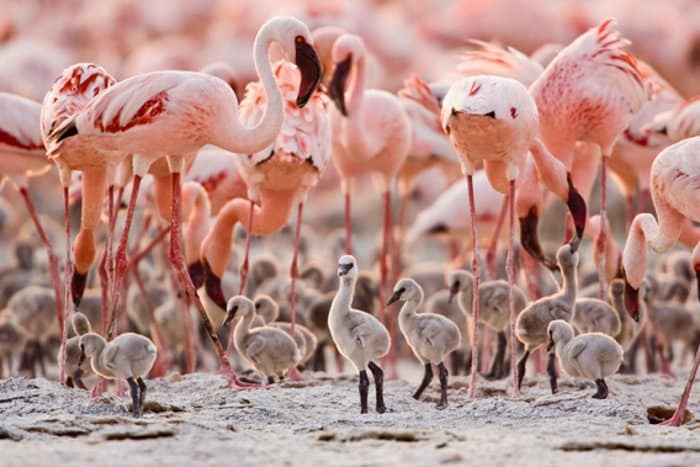April 7, 2018
Last week, the conservation world received some extremely good news when the Government of Tanzania decided to abandon plans to construct a soda ash factory at Lake Natron, the most significant breeding site for Lesser Flamingos (Phoeniconaias minor) after becoming aware of the potential impacts.
BirdLife International congratulates the Government of the United Republic of Tanzania on the decision, and their commitment to safeguarding flamingos.
“The government move validates our ongoing collaboration to promote ecotourism as a sustainable alternative for local communities at Lake Natron”, said Patricia Zurita, BirdLife International’s Chief Executive Officer (CEO).
“Through a three-year Darwin-funded project, a long term plan to help coordinate ecotourism as well as boost management capacity is already underway. BirdLife looks forward to continued positive engagement with the Government of Tanzania.”
Located in Northern Tanzania, Lake Natron is the ‘it’ spot for Lesser Flamingos. Although many plants and animals eschew the waters, which frequently reach temperatures above 40° C and are so alkaline as to burn skin, it’s paradise for flamingos, where the high salinity just means more food. Roughly 75 percent of the world’s Lesser Flamingos are hatched at the lake, and tourists flock to see the incredible ‘pink parade’ that results when flamingos strut around doing their mating dance.
The threat to Lake Natron first came up in 2006 when Tata Chemical Industries and the Tanzanian Government’s National Development Corporation (NDC) announced a soda ash mining proposal. Building a soda ash factory near the lake would have been disastrous to people and flamingos. The factory would have taken valuable freshwater away from flamingos as well as locals communities, and pumping waste into the lake would have lowered the quality of the water. NDC now proposes to focus on soda ash deposits in Engaruka, about 50 kilometres away.
“The lives and livelihoods of our people are inextricably linked to this lake and its environment”, said Councillor Ibrahim Sakai of Engaresero Ward at Lake Natron. “A soda ash factory would have disrupted our livestock grazing lands and watering areas; we can now look at a bright future through ecotourism.”
John Salehe, the Board Chair of Nature Tanzania, a bird-focused NGO based in Arusha, echoed these sentiments.
“We are delighted that our government has decided to protect Lake Natron, which is a global gem for Tanzania, Africa and the world. The future of critical ecosystems such as Lake Natron is in ecotourism, which contributes over 12% to the Gross Domestic Product of Tanzania and other East African countries.”
This article was first published by BirdLife International on 21 Mar 2018.













Đăng nhận xét